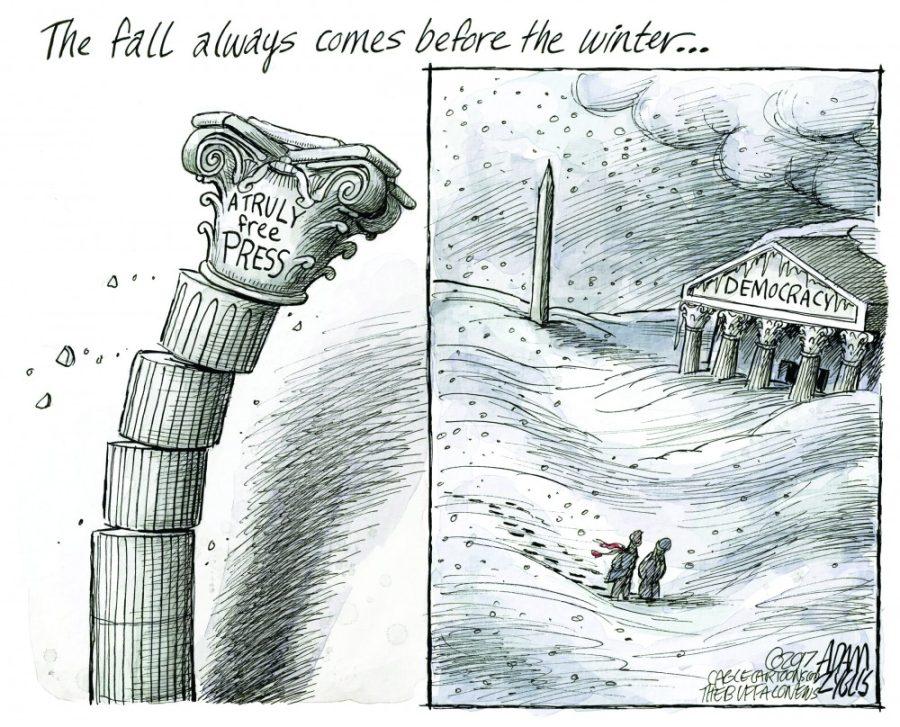For many Americans watching the electoral process in 2015 and 2016, the idea of a Trump presidency was terrifying—akin to tyranny.
Though, it wasn’t reality then.
Many held onto the prospect that the chances of him being elected were incredibly slim. The anti-Trump constitutional idealists had a lot of hope over the last election season. Even if he was elected, it wouldn’t be easy for everything to go downhill. After all, the checks and balances written into the U.S. constitution protected against any of even the most absurd fears, right?
Right?
Slowly, that idealist hope has been chipped away. Over the last few months, some of the fundamentals of checks and balances have turned up non-existent, warped or regarded as “mere tradition.” As the political parties fight each other for dominance in government, they throw checks and balances by the wayside in favor of strategic partisanship, increasing the possibly for future despotism in any of the branches of government.
RELATED: U.S. Senate examines Trump Cabinet, could have potential impact on UA
Long before Donald Trump and Hillary Clinton had secured their party’s nomination Antonin Scalia died, leaving an empty seat on the Supreme Court. President Barack Obama subsequently nominated Merrick Garland for the Court according to constitutional duty. However, the Republican-majority in Congress refused to confirm any appointment.
Theoretically, the Supreme Court was supposed to be a body independent of politics, forming a check against the dominant party of Congress pushing forward unconstitutional legislation.
This check has long ceased to exist.
It’s said that a president’s work can outlive him for decades because of his appointments to the Supreme Court. The very action of refusing to vote showed the fear of political power on the Court; it also shifted much of the Supreme Court’s power to the legislative branch, and more specifically, to the dominant party.
Because of this vacancy, recent decisions on the court favored conservative viewpoints. The Senate gained immense power in deciding the interpretation of laws throughout the United States, a function of government that was never delegated to it at all.
Nov. 8, 2016 passed, and Donald Trump won the majority of the electoral count in the election. But again, anti-Trump constitutional idealists did not run out of hope.
For the first time in modern history, it seemed like electors would have a chance to exercise their constitutionally prescribed check on the people. The “Hamilton Electors” urged the Electoral College to break with their pledged votes and choose a moderate candidate, like John Kasich. It seemed like there was a possibility that Donald Trump was not guaranteed the presidency.
In reality, the idealists learned that the chance of the Electoral College swinging the election was zero. Twenty-nine states and Washington, D.C. have laws against “faithless electors.” Many electors who would have broken allegiance were replaced.
This election confirmed that the Electoral College really was just a tradition—no check existed. Partisanship again likely caused this check to become obsolete. Protecting against “rogue” electors swinging an election also protects against a party feeling cheated out of its opportunity to influence national politics.
Dec. 19, 2016 passed, Donald Trump was the official President-elect, but the Constitutional idealists weren’t out of hope yet. After all, Donald Trump constitutionally couldn’t form his executive branch without the approval of Congress.
RELATED: Unlicensed contractor builds cabinet
Then the transition period brought accusations of rushing Cabinet hearings by the Office of Government Ethics.
Both parties over the last few elections have consistently lowered the ability of the opposite party to check the confirmation process.
In 2013, Democrat Harry Reid led the democrats to lower the number needed for appointment from 60 to a simple majority of 51, meaning that the majority party in the Senate could confirm a president’s cabinet without any support of the other side.
This year, Republican Mitch McConnell has not made any effort to delay the votes on the cabinet appointments to wait for the completion of their ethics reviews, despite mandating a “fair and consistent application” of the vetting process in 2009.
Although the Cabinet is not set, likely the Senate will confirm all of Trump’s nominees without too much contention from the Democratic party, meaning that this party willingly gave away its check on the President by allowing Donald Trump to appoint any nominees he wanted, whether or not they best suit the values of the nation.
And thus, the constitutional idealist has little else to lean on. This all brings to question whether the constitution will continue to govern the nation, or if it will become an empty tradition like the Electoral College, only following the motions without the intent of its original creation.
A constitution not followed is no constitution at all; the only way to keep faithful to the nation’s rule of law is to lessen political ties and enter into a period of unity.
Follow Toni Marcheva on Twitter.









